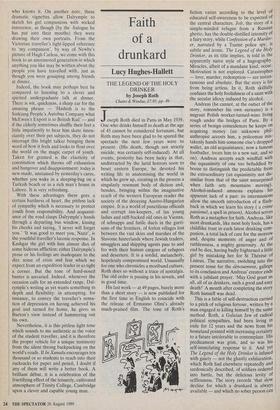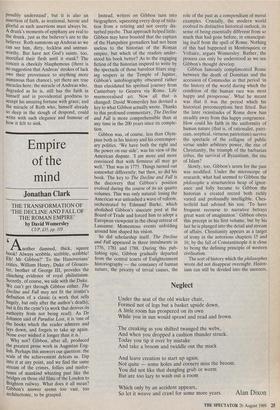Faith of a drunkard
Lucy Hughes-Hallett
THE LEGEND OF THE HOLY DRINKER by Joseph Roth
Chatto & Windus, £7.95, pp. 49
Joseph Roth died in Paris in May 1939. One who drinks himself to death at the age of 45 cannot be considered fortunate, but Roth may have been glad to be spared the spectacle the next few years were to present. (His death, though not strictly suicide, was certainly self-induced). At all events, posterity has been lucky in that, undistracted by the lurid horrors soon to beset eastern Europe, he devoted his writing life to anatomising the world in which he grew up, creating in the process a singularly resonant body of diction and, besides, bringing within the imaginative reach of the western European reader the society of the decaying Austro-Hungarian empire. It is a world of punctilious officials and corrupt inn-keepers, of lax young ladies and stiff-backed old ones in Vienna, of schnapps and futile duels in the garri- sons of the frontiers, of forlon villages lost between the vast skies and marshes of the Slavonic hinterlands where Jewish traders, smugglers and shipping agents pass to and fro with their human cargoes of refugees and deserters. It is a sordid, melancholy, hopelessly compromised world. Unusually for one who chronicles a moribund culture, Roth does so without a trace of nostalgia. The old order is passing in his novels, and in good time.
His last work — at 49 pages, barely more than a short story — is now published for the first time in English to coincide with the release of Ermanno Olmi's already much-praised film. The tone of Roth's
fiction varies according to the level of educated self-awareness to be expected of the central characters. Job, the story of a simple-minded refugee from a Russian ghetto, has the double-distilled intensity of a fairy story, while Confession of a Murder- er, narrated by a Tsarist police spy, IS subtle and ironic. The Legend of the Holy Drinker, as its title implies, is told in the apparently naive style of a hagiography. Miracles, albeit of a mundane kind, occur. Motivation is not explored. Catastrophes
love, murder, redemption — are instan- taneous and absolute. But the story is far from being artless. In it, Roth skilfullY confuses the holy foolishness of a saint with the secular idiocy induced by alcohol.
Andreas (he cannot, at the outset of the story, remember his own surname) is a migrant Polish worker-turned-wino living rough under the bridges of Paris. By a series of benign coincidences he keeps on acquiring money (an unknown phil- anthropist accosts him, a policeman mis- takenly hands him someone else's dropped wallet, an old acquaintance, now a famous footballer, treats him to a new suit, and so on). Andreas accepts each windfall with the equanimity of one too befuddled by booze to distinguish the predictable from the extraordinary (an equanimity not dis- similar from that of the saint unsurprised when faith sets mountains moving). Alcohol-induced amnesia explains his apparent lack of a past: its intermissions allow the smooth introduction of a flash- back in which we learn his story ( a crime passionel, a spell in prison). Alcohol serves Roth as a metaphor for faith. Andreas, like most drunkards, like most holy fools, has a childlike trust in each latest drinking com- panion, a total lack of care for the morrow and, despite moments of anger and of ruthlessness, a mighty generosity. At the end he dies, having badly frightened a little girl by mistaking her for St Therese of Lisieux. The narrative, switching into the present tense for the denouement, gallops to its conclusion and Andreas' creator ends with a jubilant prayer. 'May God grant us all, all of us drinkers, such a good and easy death!' A month after completing the story Roth himself was dead.
This is a fable of self-destruction carried to a pitch of religious fervour, written by a man engaged in killing himself by the same method. Roth, a Galician Jew of radical political sympathies, had been living in exile for 12 years and the news from his homeland pointed with increasing certainty to a future intolerable to contemplate. His predicament was grim, and so was his self-immolating response to it. And yet The Legend of the Holy Drinker is infused with gaiety — not the ghastly exhilaration, which Roth had elsewhere repeatedly and sardonically described, of soldiers ordered into battle, but the delicious levity of selflessness. The story records 'that slow decline for which a drunkard is always available — and which no sober person can Possibly understand', but it is also an assertion of faith, as irrational, heroic and gleeful as such assertions must always be. A drunk's moments of epiphany are real to the drunk, just as the believer's are to the believer. Roth summons up Andreas so we can see him, dirty, feckless and untrust- worthy. But have not God's saints, too, mortified their flesh until it stank? The conceit is cheekily blasphemous (there is no suggestion that Andreas' strokes of luck owe their provenance to anything more numinous than chance), yet there are true miracles here: the miracle of Andreas who, degraded as he is, still has the faith in himself and in providential goodness to accept his amazing fortune with grace; and the miracle of Roth who, himself already SO deep in the slough of despond, could write with such elegance and humour of how it felt to sink.











































 Previous page
Previous page